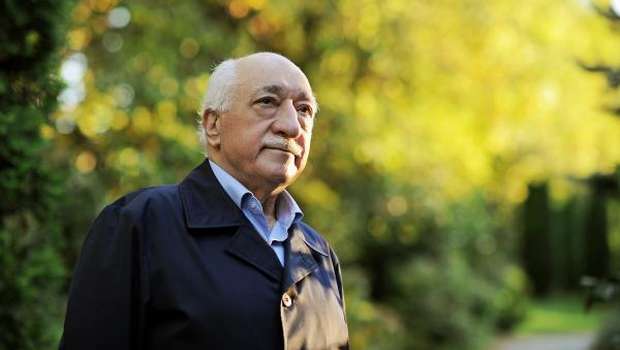Gülen has strongly rejected comparison to Iran’s Khomeini time and again

Date posted: January 30, 2015
Justice Minister Bekir Bozdağ’s recently rehashed allegations that Turkish Islamic scholar Fethullah Gülen planned to return from the US to Turkey in a way similar to Iran’s revolutionary leader Ayatollah Ruhollah Khomeini are decades-old discredited claims that have been refuted time and again by Gülen himself in his published statements.
Gülen, who has been critical of the Iranian revolution for having been staged in the name of Islam, said in an interview published in the Turkish daily Milliyet in 2005 that the negative developments that followed the revolution sparked outrage and hatred against Muslims all over the world.
“I do not know what benefits Iranian people received from this revolution, but it certainly cast a wide net of suspicion over other Muslims. Now all Muslims have been put under a magnifier in the world to see whether they harbor such ambitions as well. These suspicions deepened with the 9/11 events. It turned into paranoia. For Muslims, the movement in Iran became harmful,” he explained.
Gülen lamented that the Iranian revolution led to limiting the ability of Muslims who are serving to their communities with goodwill. Stressing that Islam places a great deal of emphasis on the social aspect of people’s lives that has nothing to do with the rules and laws of the state, Gülen said these activities which do not disturb or interfere with state affairs are also looked at suspiciously because of the Iranian revolution. He stated even a small-scale activity by Muslims is viewed as if it were another potential Iran-type movement. “Some started to call people in these Islamic movements ‘mullahs’ and even label some of them as Khomeini,” Gülen noted in that interview.
In a speech given on June 25, 2008 and posted on the website www.herkul.org, Islamic scholar Gülen, referring to claims in some media that said “Gülen will return to Turkey like Khomeini [returned to Iran],” he said he could not be Khomeini, as he was not an Iranian and never subscribed to the positions Khomeini held. “I have had nothing to do with Khomeini character-wise, in a sectarian aspect or country-wise,” Gülen said, rejecting any plans or plots like those Khomeini had harbored for a long time before returning to his country.
Emphasizing that he does not share the views of Iranians, Gülen also remarked: “I am a child of this [Turkish] nation. Those who compare me to Khomeini will feel ashamed one day,” he said.
In another interview that was published by the Yeni Yüzyıl daily in 1997, Gülen was very clear in his remarks, saying that Turkey can never be like Iran. “For one, the religious approach is completely different,” he said, pointing to the strong structural relationship and hierarchy between the clerics and their followers as one of the pillars of the Shiite faith. “There is no such thing in the Sunni faith,” he noted.
There is no doubt that the Gülen movement is one of the most powerful social and civic movements in Turkey, yet there is no evidence that the movement has plans for a new political system. The movement focuses on modern education as a way to raise a child to be highly qualified in science and with good moral character. It has always kept its distance from politics and never established a political party. Gülen has repeatedly denounced having any intention of creating a political party.
Allegations about Gülen following Khomeini’s path are certainly not new. It is the rhetoric that has been employed to criticize Gülen and the Gülen movement at home and abroad. For instance, Michael Rubin, a neocon, used to warn America and Western powers that Gülen would establish an Islamic state in Turkey just like Khomeini.
Lawyers for Gülen said on Wednesday that Justice Minister Bozdağ should have provided proof to back up his statement that Gülen planned to return from the US to Turkey in a way similar to Khomeini.
When senior government officials, including then-Prime Minister Recep Tayyip Erdoğan called on Gülen to return to Turkey a few years back, Gülen said he did not want to risk damaging the democratic gains in Turkey because of possible controversy some circles may create about his presence in the country.
For example, responding to a call from Erdoğan in June 2012 for his return to Turkey, Gülen extended his thanks to Erdoğan for his kind invitation, but said he prefers staying in the US to “avoid damaging positive developments in Turkey.”
Gülen is highly respected in both Turkey and in many countries around the world for the educational activities he has pioneered, along with his efforts to promote intercultural and interfaith events around the globe. He is in self-imposed exile in the US, though there is no legal hurdle that prevents him from returning to Turkey. Shortly after he went to the US in 2000, he was charged with establishing an illegal organization in Turkey, but was eventually acquitted in 2008.
In a complete reversal from his earlier position, now Erdoğan sees Gülen as his enemy and accuses him of instigating corruption investigations against his government, a charge that Gülen has vehemently denied repeatedly. A government-orchestrated investigation now targets Gülen, and Erdoğan has said he will seek his extradition from the US, although no official request has been made.
Reacting to Bozdağ’s statements on Wednesday saying Gülen would have returned to Turkey like Khomeini, who returned to Iran from France in 1979, if the corruption probes in December 2013 had caused the downfall of the Justice and Development Party (AK Party) government, a Twitter account run by the Islamic scholar’s lawyers tweeted that the allegations of the justice minister have been denied several times by Gülen himself.
AK Party circles and President Erdoğan have accused the Gülen movement, popularly known as the Hizmet movement, and its sympathizers in the state bureaucracy of planning to overthrow the AK Party government since a huge corruption scandal erupted on Dec. 17, 2013 that implicated key government members, Erdoğan and his family. Erdoğan also accused Gülen of creating turmoil in Turkey and claimed that the Gülen-inspired Hizmet movement is working against the AK Party.
Confirming that the government has been pursuing a witch hunt against the Gülen movement since December 2013, Bozdağ said in his statement on Wednesday that “the new Turkey has stopped that transformation with [the anti-Gülen operations instituted after] Dec. 17, 2013.”
Erdoğan has called the investigation, which led to the resignation of three government ministers and the dismissal of a fourth, a “coup attempt,” and in response, he has had thousands of police officers, judges and prosecutors removed from their posts.
Gülen’s lawyers’ tweets also said that Bozdağ, as an accuser, is responsible for proving his allegations that Gülen would have returned like Khomeini. The lawyers noted that the allegations of AK Party circles against Gülen and the Gülen movement are an attempt to cover up the accusations against the AK Party. “The statement of the minister is irresponsible,” the lawyers wrote.
Source: Cihan , January 30, 2015
Tags: Defamation of Hizmet | Fethullah Gulen | Turkey |
























